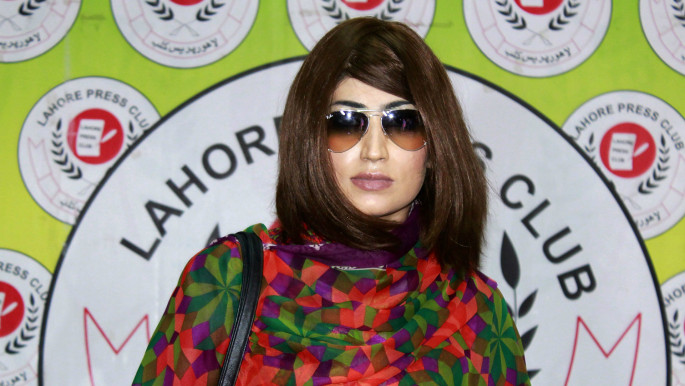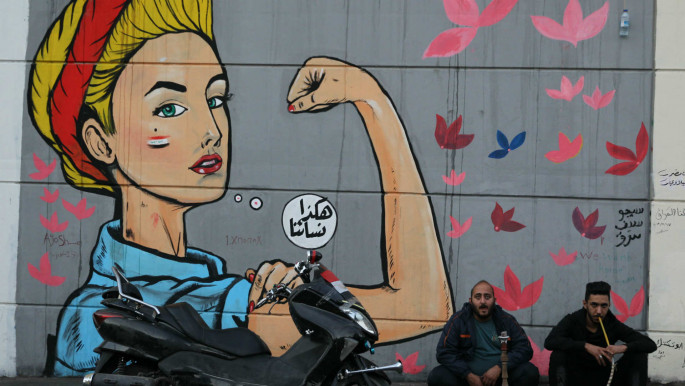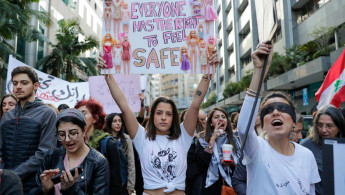Why women activists are taking gender-based violence into their own hands
After Israa Ghrayeb died for "disrespecting the honour" of her family, Arab women everywhere decided to speak out against the violence that affects too many women in the region.
"It created an uproar," says Rothna Begum, an expert on women's rights in the Middle East and North Africa for Human Rights Watch.
Hashtags such as "No honour in honour crimes" and "We are all Israa Ghrayeb" started to flood Arabic Twitter.
"People started asking how it could happen to someone who was so widely known on social media, whose subjection to violence was recorded on the internet," says Begum.
Israa, a young Palestinian make-up artist, had talked about the abuse she suffered at home on her social media channels. One of her last posts – an innocent photo of herself with her fiancé – would lead to her murder.
Local media said her family was dishonoured by the 21-year-old exposing herself in public with a man.
When she was taken to the hospital for serious injuries multiple times, her brother-in-law, Mohammad Safi, said she had mental health problems and fell from their balcony, but this was rejected by the doctors who attempted to save Israa's life.
The police took no further action.
Palestinian women started pointing their fingers at the state, which legalises the defence of honour killings for men who have inflicted violence on women in their families.
 |
|
| Read also: Shining a light on the dark corners that built up and knocked down Qandeel Baloch |
Honour crimes are perpetrated by those who accuse the victims of bringing shame upon their family.
Due to 'standards of honour' often being more strict for women, it concludes in a disproportionate violence against them.
Begum warns on the usage of such terms: "Honour killings are often used as excuses for sexual violence. The perpetrators will use this as a shield for their actions. They are used to stigmatise victims of domestic violence and to control behaviour."
While Israa's death became infamous due to her social media presence, there are thousands of invisible women who suffer the fate of Israa every day.
 |
Honour killings are often used as excuses for sexual violence. The perpetrators will use this as a shield for their actions. They are used to stigmatise victims of domestic violence and to control behaviour |  |
Around one in four women are likely to be subject to domestic violence in Yemen, Morocco, Egypt, Sudan, and Algeria, according to a study carried out by Princeton University. Men are also likely to suffer domestic abuse in every single one of the countries surveyed.
That means 1.5 million women in Egypt are victims of domestic abuse every year. Even though the Egyptian constitution dictates that women should have protection against violence, domestic violence isn't criminalised under national law.
According to the same study by Princeton University, most victims of domestic violence will turn to a family member for support.
The study also shows that most women believe men still have the final say in family matters. These two factors together mean that many do not look to the state for help or authority, and that family life still dictates the future of domestic violence victims.
But women like Israa should be able to turn to authorities, especially in the cases of abuse from her own family. So are states doing enough to establish trust between themselves and victims of gender-based violence?
 |
| An Iraqi protester holds a sign reading: "Revolt, women make history. You are the revolution and they are the taboo" [Getty] |
Almost half the countries in the Middle East and North Africa in the past five years have enacted laws addressing domestic violence, according to Human Rights Watch.
But states are also passing legislation that may not necessarily act as effective measures, but rather serve to provide an illusion of progression to the international community.
 |
|
| Read also: Jordan overturns archaic labour code provision that discriminates against working women |
"Women's policies are seen as a way to modernise a state.
"So states may sometimes pass legislation that looks good on paper, but does not set out to fix other problems affecting women," says Begum, who has worked on pushing states to adopt international legislation to mitigate gender-based violence.
This is the case in Saudi Arabia, where Crown Prince Mohammad bin Salman (known as MbS) has embarked on efforts to modernise the country, but still punishes women for demanding basic liberties.
Women are left exposed to domestic violence under an oppressive male guardianship system which leaves them little or no safe havens when they face abuse.
 |
Women's policies are seen as a way to modernise a state. So states may sometimes pass legislation that looks good on paper, but does not set out to fix other problems affecting women |  |
"MbS has attempted to look like he's modernising the country," says Begum, referring to the country's recent lift on the ban of women driving and travelling abroad.
"Those are visible reforms that the world can see, but they are not willing to push reforms regarding the freedom of expression and association nor the right of civil society spaces. They are not interested in allowing activism in the country, especially from women."
 |
| A Lebanese demonstrator holds a sign with the slogan made famous by Chilean feminists [Getty] |
Begum argues that the advancements made in the region are due, in great part, to the pressure that has been put on the state from women's groups and activists.
Read also: Moroccan #MeToo helps women break their silence against sexual harassment and rape
This was exemplified in the run up to International Women's Day by Jordanian women's groups' efforts leading to a victory against the country's archaic labour law.
Article 69, which granted the labour minister discretion over occupations, industries and work hours deemed suitable for women, was finally reversed.
This happened after years of lobbying by activists: "This week's outcome is perhaps better than what we anticipated, for it favours women," campaign leader Mayyada Abu-Jaber told The New Arab.
Examples of this activism was also seen throughout Iraq's and Lebanon's recent protests, where women took up important roles in demanding an overhaul of their entire political systems.
Iraqi women risked their lives in clashes which resulted in 600 deaths since October, according to Amnesty International, while demanding an end to corruption, unemployment and inefficient public services.
Lebanese women took to the streets against religious courts demanding their equality, their right to inheritance and their right to pass their nationality to their children.
Read also: 'The revolution is female': Why feminist issues are driving Lebanon's protests
Also in Lebanon, women took to the streets with banners, bandanas and red hand prints over their mouths, to signify the silence they are forced into by their state when they suffer abuse.
 |
| "Our women are like this": An Iraqi riff on the famous "We can do it!" World War II poster [Getty] |
They joined women throughout the region to perform powerful dances to Un Violador En Tu Camino (A Rapist in your Path) – a song which calls for an end to the heinous crimes that females are subjected to throughout the world, and which was rendered famous by Chilean feminists.
"We wanted to join hands with women all over the world, to have one voice, one cause: defend ourselves against any sort of gender-based violation," Aya Joumaa, one of the main organisers of the march, told The New Arab.
"No matter what your origin, race, or beliefs are, as women we are facing the same discrimination and violence. We want to say to our government that we won't be silent anymore."
But many are not free to speak out against abuse. More than a dozen of Saudi activists are held in detention in the kingdom, which is infamous for its poor treatment of prisoners and women.
Loujain al-Hathloul is a human rights activist who was jailed in Saudi Arabia for being outspoken against the regime.
 |
No matter what your origin, race, or beliefs are, as women we are facing the same discrimination and violence. We want to say to our government that we won't be silent anymore |  |
Human rights organisations including Amnesty International have alleged that Hathloul and other women campaigners have been subjected to torture and sexual harassment, including threats of rape, while in detention.
Her sister, Alia al-Hathloul, recounted to France24 how her sister sent a letter to their parents saying she was harassed and sexually violated whilst being tortured at the hands of Saudi authorities. She said that sex was all the guards harassing her could talk about.
"Women rights activists are either in prison, silenced, intimidated or banned from travelling so they are not able to speak on these issues," says Begum, reflecting on how the advancement of women rights in the region is dependent on those voices being able to speak out.
"We cannot expect that these reforms will continue without a civil society that is independent and free to report on this."
Women's bodies become the battlefield between liberation and oppression, which is an issue that many believe should remain in the privacy of the home. But as women throughout the world leave their homes in search for justice, they are destroying the barriers and prejudice which their states are complicit in.
On this International Women's Day, let's remember the 17,700,000 women who have reported a sexual assault since 1998, as reported by the #MeToo campaign.
Gaia Caramazza is a journalist at The New Arab.
Follow her on Twitter @GaiaCaramazza



